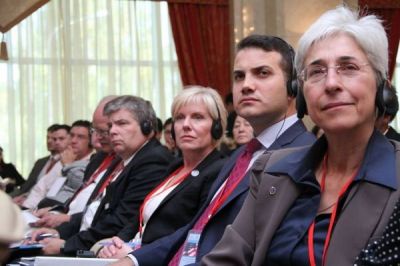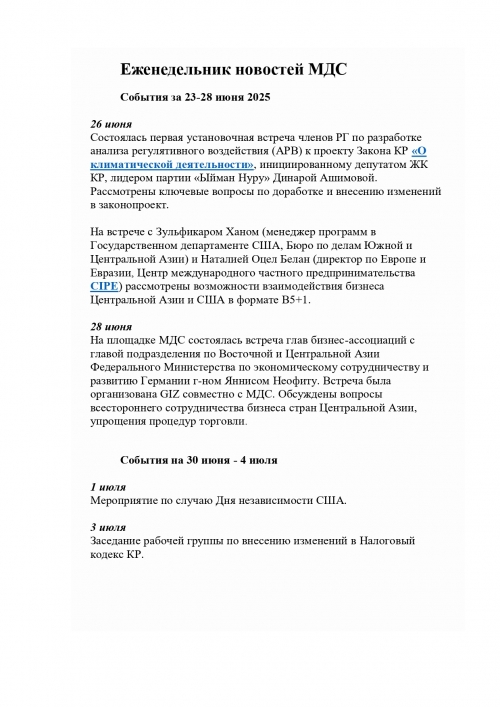News /
IBC news /
Kyrgyz-American Economic Forum held in Bishkek

The prospect of Kyrgyzstan’s accession to the Customs Union of Russia, Kazakhstan and Belarus opens a huge market for American investors, said Minister of Economy of Kyrgyzstan Temir Sariyev at the Second Kyrgyz-American Economic Forum on September 25. The meeting was aimed at discussing and improving trade and economic relations between the two countries. The event was organized by the Association of Young Entrepreneurs of Kyrgyzstan, the Investment Promotion Agency under the Ministry of Economy, and the Parliament. The first Kyrgyz-American Economic Forum was held in 2013 in Washington.
Kyrgyz First Deputy Prime Minister Tayirbek Sarpashev, Parliament deputies, representatives of international organizations and the business community, senior representatives of the USA government and scientific institutions and senators took part in the event.
"Strengthening bilateral relations with the United States is one of the priorities in the foreign policy of the Kyrgyz Republic, given that the USA is the largest and most diversified economy in the world," Sariyev said.
Unfortunately, the current trade, economic and investment cooperation between Kyrgyzstan and the USA is rather modest, he said. The US accounts for only 2.8% of Kyrgyzstan’s foreign trade. In 2013, bilateral trade amounted to $227.3 million, 10.7% less compared to 2012. Over the past three years, the economy of Kyrgyzstan has received only $5.52 million of direct investment from the United States.
Kyrgyzstan’s neighborhood with the rapidly growing China and the prospect of the accession to the Customs Union open a huge market to the American investors.
Many sectors of Kyrgyzstan’s economy are attractive for investment, said Sariyev. The Government created the most favorable tax treatment in the region for the agricultural sector, particularly in the processing of agricultural products and agricultural production.
With its unique nature, Kyrgyzstan intends to take measures to promote tourism. The country has many nature reserves, biosphere areas, and resort and recreation facilities. There are huge opportunities for eco-tourism, mountaineering, hunting and other outdoor activities that American citizens are particularly fond of.
Kyrgyzstan is rich in mineral resources. The country has 420 tons of examined gold reserves and many other minerals such as mercury, antimony, tin and rare metals.
Energy is also a priority sector of Kyrgyz economy. About 90% of electricity is generated by hydroelectric power plants (HPP). This greatly increases the attractiveness of the hydropower sector for the clean energy investment that pays a lot of attention to the conserving of natural capital for future generations.
After the reforms, Kyrgyzstan has favorable conditions for doing business, said Economy Minister. The Government has focused on the economic liberalization, creation of a favorable investment climate and fighting corruption. In recent years, the state apparatus has been reduced by 20% and the number of public services from 20,000 to 380. Unreasonable interference of state bodies in the activities of businesses has been excluded, the Minister added.
Risk management criteria were introduced to increase the effectiveness of inspections of business entities. As a result, the number of inspections has been reduced twice, and the number of required licenses and permits from 518 to 101.
To increase FDI flows to Kyrgyzstan, an Investment Promotion Agency (IPA) has been created under the Economy Ministry. The Agency will provide investors with information on investment opportunities in Kyrgyzstan, and will promote public-private partnership. The IPA will contribute to the implementation of joint investment projects, and strengthen mutually beneficial cooperation between the business communities of Kyrgyzstan and the USA.
Minister Sariyev stressed the active cooperation of the two countries as part of donor assistance programs through multilateral financial institutions and the USAID in education, enhancing the governance capacity and transparency, and facilitating economic and political reforms.
The opinion of Minister Sariyev about investment attractiveness of the energy sector was shared by the US guests. According to Director of the Center for the Study of Democracy at St. Mary's College of Maryland Dr. Michael Cain, the energy system of Kyrgyzstan may attract foreign investors due to its environmental cleanliness and great potential. However, a large number of independent distribution companies should operate in the system. To make the energy sector attractive for investors, it is necessary to commercialize the production of electricity, establish independent regulation and strengthen its financial transparency.
According to IPA Director Almaz Sazbakov, the Kyrgyz Law "On investments" provides for an equal playing field for both local and foreign investors. The country has huge water resources and cheap labor resources. Business can be opened within ten days here, he said. Kyrgyzstan was the first Central Asian country to become a WTO member in 1998, and the country has a liberal trading system.
The forum presented Kyrgyzstan as a country open and safe for business and residence, Sazbakov believes. American businessmen received specific information on possibilities and conditions of opening and running a business in Kyrgyzstan.
However, the Agency does not expect an immediate effect from the forum, as building business relationships takes a long time, especially with Western partners. Sazbakov believes that such annual meetings will produce positive results in the future. For instance, after the first economic forum in Washington, some businessmen from Kyrgyzstan started their business in the United States.




























